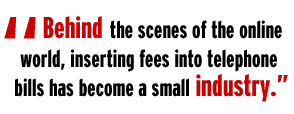| |||||||||

Watch out for Internet 'no-service' providers
 Consumers should beware of a new class of Internet service providers: ones that add mysterious charges to your local telephone bill without providing
you with any Internet service at all. Consumers should beware of a new class of Internet service providers: ones that add mysterious charges to your local telephone bill without providing
you with any Internet service at all.Inserting fees into phone bills differs from making unauthorized charges to credit card numbers, as several Web sites have been accused of doing. Internet "no-service" providers that slip charges into telephone billing statements are potentially even more dangerous because many people assume, mistakenly, that their phone bills can include only charges for local and long-distance calls. These consumers, therefore, don't carefully examine their phone statements for Internet service contracts they didn't authorize. Take the case of Mercury Marketing of Delaware. The Philadelphia-based company operates GoInternet.net, which promotes email and Web site hosting services. The U.S. Federal Trade Commission filed a lawsuit last week charging Mercury with affixing questionable Internet service fees to customers' phone statements.
The suit claims that Mercury added "unauthorized monthly charges ranging
from $24.95 to $29.95 for the Internet-related services to the consumers'
local telephone bills." The FTC alleges that Mercury personnel called numerous customers to propose creating Web sites for them. According to the suit, Mercury began processing monthly charges against the phone bills of customers who declined the service or only wanted to receive additional information. A Mercury representative said the company had no comment on the lawsuit. Most credit card holders know that stolen card numbers can be misused. But consumers often don't realize that their phone numbers are another way for a non-phone company to collect a fee. Behind the scenes of the online world, inserting fees into local phone bills has grown into a small industry. "Businesses other than telephone companies can charge consumers' phone bills for their services," FTC staff attorney Brenda Doubrava says. Companies that make telemarketing calls may initiate charges on local phone bills based on nothing more than a brief conversation with a consumer. A list of customers to be charged, along with their phone numbers, is forwarded by the telemarketer to a clearinghouse known as a "billing aggregator." The charges then appear on local phone bills under the aggregator's name. There is usually, but not always, a reference to the company that the aggregator is billing for. Many charges placed through billing aggregators are perfectly legitimate. But in serious cases of fraud, even if a consumer says "no" when contacted, an unscrupulous telemarketer may claim that a charge was "authorized." John Mendenhall, regional director of the FTC's Cleveland office, recommends that consumers always verify the physical address and phone number of any company that they come into business contact with. "Say you visit a Web site, for example, and it's difficult to find out the address and phone number of the company you're dealing with," Mendenhall said. "Or it's a foreign entity. Then it's very difficult to get any kind of redress if you have a problem." Because of the potential for fraud, carefully examining your monthly phone bill is now just as important as reading any credit card statements you receive. With all the small details in many of today's phone statements, it's not easy to spot charges that may be unauthorized or illegitimate. Looking for the names of companies you don't recognize can help ferret out suspicious amounts. Any unexplained charge that shows up two or more months in a row, of course, should be taken as a very serious warning. The FTC announced Tuesday the creation of a new Web site designed to help consumers recognize potential Internet fraud. It's bad enough paying for Internet services that are slow or buggy. But even worse is paying for services you never actually received. Consumer advocate Brian Livingston appears at CNET News.com every Friday. Do you know of a problem affecting consumers? Send info to tips@BrianLivingston.com. He'll send you a book of high-tech secrets free if you're the first to submit a tip he prints. biography |
|
|||||||||||||||||||||||
|
Send us news tips | Contact Us | Corrections | Privacy Policy |
|

